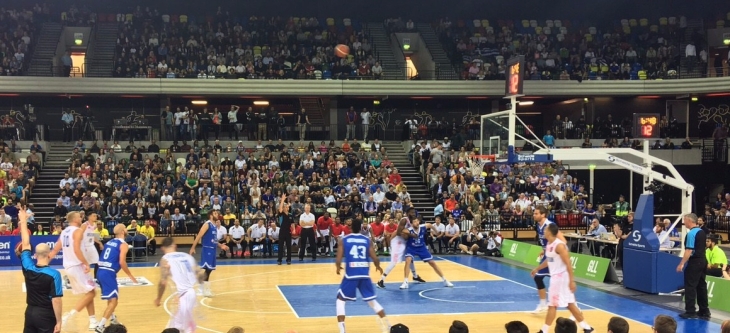
I had the privilege of spending Saturday evening with a packed crowd at London’s Copper Box watching Great Britain take on Greece in an international men’s basketball game. On the basis of their respective world rankings, and the quality of the players (a number of the Greeks are in NBA teams), this should have been an easy win for Hellas. And yet, GB almost took the game. In a very tightly fought match, the Greeks won by only four points with a final score of GB 84 to Greece 88.
This was probably only the fourth basketball match I have seen in my life, one at the London 2012 Olympics, the two BBL/WBBL finals at the O2 this year, and then this international friendly. And I doubt I would have gone to either of the most recent fixtures had British Basketball not had the good sense to appoint my friend and former colleague Lisa Wainwright as their Chief Executive. Lisa who was formerly Volleyball’s CEO, and a senior director at Sport England, is a phenomenal sports administrator with huge energy and passion and a drive to get her team to succeed and bring new people to her sport.
And in my case, she has succeeded. I’m hooked on basketball. It plays to so many of my interests: an exciting team sport which really drives social inclusion. You see, not only was Saturday’s match fast moving and exciting, but it was also a pleasure to witness huge diversity amongst the players, volunteers, and especially the crowd. Basketball draws in people who are all too frequently under represented on the field of play or in the stands at rugby, cricket, tennis, and football matches, most notably from Britain’s African-Caribbean communities.
Despite this, basketball fights for a seat at the table when it comes to both funding and media coverage. Of course, any sport that isn’t in the ‘big four’ is unlikely to get much media attention away from Olympic and Paralympic Games and sometimes world championships, and that is a constant frustration and, of course, means that major sponsorship deals are unlikely. And the UK’s exchequer/lottery funding model for sport does not help those that are developing and are not already successful, especially team sports. One potential legacy of 2012 that has been thrown away was the possibility of enhancing those sports that, for once, were given support to develop a home team for the London games. Without funding, it is doubtful that we will see GB handball, volleyball, or water polo making it to the world stage again.
In basketball’s case, the governing body has been given a short-term lifeline by Sport England, who stepped outside their normal participation funding remit to provide a one- year grant to keep the British Basketball Federation going. Of course that is to be welcomed, and Sport England’s Chair Nick Bitel and CEO Jennie Price deserve thanks for stepping up to the plate, but such temporary funding arrangements aren’t going to help the sport develop the elite game, or encourage more people to join at grassroots.
Moving forward, basketball deserves proper support, be that from UK Sport or Sport England. It needs to be able to secure top level sponsorship and media coverage to grow involvement in the game adding both participants and spectators. Basketball has already got a unique reach into communities that are not often engaged in British sporting life, and that could be developed much further through local clubs, the professional BBL and WBBL leagues, and support in international competitions. It is time to get behind the game and allow it to grow and become the success it can be at both a domestic and international level.
Edward Lord OBE is a diversity champion, and a passionate advocate for inclusion in sport. They chaired Swim England from 2013-15 and the London FA’s Inclusion Advisory Group 2012-17, and served briefly on the FA’s Inclusion Advisory Board. Edward is a Stonewall role model and received the OBE in 2011 for their public work promoting equality and inclusion.
